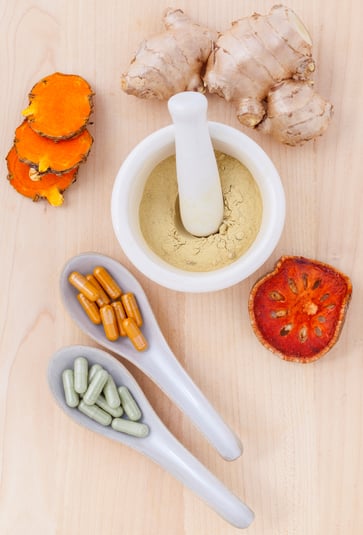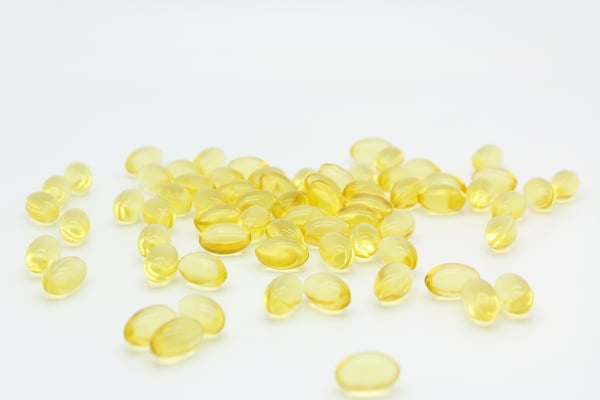
COPD is a relatively common and well-researched condition, which means there are lots of different medications and treatments to help people who suffer from the disease. These include a variety of "natural" treatments for COPD patients that can alleviate both physical and psychological symptoms.
Natural COPD treatments are non-pharmacological treatments that you can take control of yourself. They are opportunities to make changes to your personal habits, health routines, and nutrition to more effectively treat your COPD symptoms at home.
In this post, we're going to introduce you to a number of natural treatments that you can use to improve your COPD. We'll show you how supplements, lifestyle changes, and other natural solutions can help you better manage your symptoms and improve your quality of life.
By helping you take a more well-rounded approach to your health, natural treatments can boost your physical health, mental health, and help you avoid serious health complications from COPD. Using natural treatments can also help you feel more in control of your health and your overall well-being.
The treatments we discuss in this guide are generally safe, accessible, and effective, as long as they are used in combination with standard treatments for COPD. Continue reading to learn more about a variety of natural COPD treatments and what they can do for you.
What is a “Natural” Treatment?

It's important to understand that “natural” is a word that means many different things to different people. It doesn't have any definite scientific or legal definition, which is why it's important to specify what we mean when we refer to a treatment as “natural”.
In this guide, we use “natural” to refer to treatments that don't rely on medical equipment or standard pharmaceutical medications. Instead, the natural treatments we will discuss are the kinds that don't require a prescription or significant supervision from a doctor.
These natural treatments, which include things like nutritional supplements, mind-body exercises, and healthy lifestyle changes, are still recommended by doctors and supported by many in the medical community. This is key, because you should never try to treat your disease with unknown or unsupported treatments.
It's also vital to understand that these natural treatments are not alternatives to taking your prescription medication and should never be used as a replacement for proper medical care. Unfortunately, there is no real replacement or “alternative” to medical COPD treatments, and you should never use any natural treatments that interfere with your primary COPD treatment plan in any way.
The “standard” treatment for COPD, which includes medication, lifestyle changes, and other medical treatments, has been carefully crafted and tested by medical experts. It is still the best known way to manage COPD, and the only known way to slow down the progression of the disease.
However, there are still a variety of natural techniques that you can use to improve your COPD symptoms and your quality of life. Doctors often recommend these natural options, in addition to standard treatments, as a means for their patients to better manage and cope with their disease.
Many people with COPD also appreciate natural treatments because they give them a stronger sense of ownership and involvement in their health. They allow you to take certain aspects of your treatment into your own hands, giving you a better sense of control over your disease.
Natural treatments also help you stay focused on important non-physical aspects of your life, such as your mental and emotional health. In this way, it can expand the scope of your treatment and ensure that you cover all your bases when it comes to your physical and mental well-being.
Natural Treatments for COPD

Now that you understand what a natural treatment is, let's take a closer look at what these treatments actually are. In the next sections, we'll introduce you to a wide selection of the most effective natural treatments you can use to improve your COPD.
Nutritional Supplements

A large number of people with COPD struggle to maintain proper nutrition. Often, this is a result of poor appetite, poor diet, or severe COPD symptoms that make it difficult to eat.
This is exacerbated by the fact that many COPD patients need extra calories to fuel their breathing muscles, which have to work overtime to help them breathe. This need for a high-calorie diet makes it much easier for people with COPD to become malnourished.
Another nutritional problem results from the fact that COPD tends to affect people later in life, when living a healthy lifestyle is often a struggle. At the same time that their bodies are especially vulnerable to nutritional deficiencies, many older adults struggle to get enough nutrients from their diet.
That's why many people with COPD take nutritional supplements to keep their brain, lungs, and the rest of their body strong. These supplements not only prevent nutritional deficiencies and help you manage your COPD symptoms, but some may also help stave off serious diseases and other health complications.
The nutritional supplements we discuss in this section could be beneficial to many COPD patients, but will not be useful to everyone. And remember, you always need to talk to your doctor before making any changes to your diet or nutrition.
When possible, it is best to get your nutrients from a well-balanced diet instead of a supplement. However, taking nutritional supplements is a helpful and often necessary way to ensure you get all the nutrients you need every day.
What's more, studies show that some supplements can even help patients who don't have nutritional deficiencies improve their COPD. What works for you will depend on your individual physiology, your symptoms, and what your doctor recommends.
Calcium
Because many patients suffer from bone density loss, calcium is important for people with COPD. Calcium is the primary nutrient responsible for keeping your bones healthy and strong, and getting too little causes bone loss and osteoporosis.
Getting enough calcium is particularly important for people with COPD, who are more prone to osteoporosis. This is because certain COPD medications, older age, and systemic inflammation caused by COPD all impair your body's ability to repair your bones.
Once you start to lose bone density, you become more prone to accidents, skeletal disfigurement, and loss of physical mobility. Even just one bad fall or injury could result in a break that significantly affects your ability to manage your COPD.
That's why experts recommend that COPD patients take extra steps to prevent calcium deficiency, which often includes taking calcium supplements. You should also make an effort to get plenty of calcium from food sources like dairy, vegetables, and fortified grains.
Getting lots of calcium through diet and supplements is a great natural treatment that helps COPD patients keep their bones and bodies strong. It may even prolong your life by protecting you against debilitating injuries and major losses in physical mobility.
Vitamin D

Vitamin D is another vital nutrient that your body needs to prevent serious problems and health conditions related to COPD. In fact, your body can't even absorb calcium without vitamin D, which makes is just as important as calcium for keeping your bones in good shape.
But vitamin D is needed for much more than just your bones; it plays a role in your immune system, your cardiovascular health, and may even play a direct role in treating COPD. Unfortunately, a large number of COPD patients have vitamin D deficiencies, particularly those whose disease is more severe.
Because of this, many experts recommend that COPD patients take extra vitamin D to supplement their diets. Studies show that getting enough vitamin D can prevent exacerbations, preserve your cardiovascular health, and even slow the progression of your disease.
Some research even suggests that taking Vitamin D supplements can improve your ability to breathe. By strengthening your breathing muscles and making it easier to exercise, vitamin D may be an effective way to improve your physical fitness and mobility.
Vitamin A
Vitamin A is an important nutrient for keeping your lungs healthy and strong. It works in your lungs to build and repair lung tissue, which is what makes it particularly important for people with COPD.
If you don't get enough vitamin A from your diet, it can make your lungs more vulnerable to infections. By reducing your lungs' ability to repair themselves, it may even make them more prone to damage from inflammation caused by respiratory illnesses and irritants like smoke.
That's why experts recommend that COPD patients take vitamin A supplements if they are likely to have a deficiency. Studies show that it may even reduce your risk for respiratory infections and further damage to your lungs.
However, taking a vitamin A supplement is not recommended if you get enough of the vitamin in your diet. In fact, too much vitamin A can cause serious health problems like liver damage, which is why you should always consult your doctor before starting a new supplement.
The Antioxidant N-Acetylcysteine
Researchers have found that COPD patients experience more “oxidative stress” than people who don't have the disease. Although experts still don't completely understand how oxidative stress works, it seems to play a role in worsening lung damage and respiratory function in people with COPD.
This has led many COPD researchers to investigate antioxidants, which they believe may be able to reduce oxidative stress in the lungs. In that way, they believe that certain antioxidants may slow down the respiratory decline experienced by COPD patients.

One antioxidant, known a N-Acetlycysteine, shows the most potential as a treatment for COPD. Researchers believe that it may have a protective effect on the lungs by protecting them from damage caused by oxidative stress.
Some studies also show that N-Acetylcysteine can also reduce chronic inflammation, which is another major cause of COPD-related lung function decline. By reducing both inflammation and oxidative stress, some researchers believe that this antioxidant may be a natural way to slow down the progression of COPD.
Other studies show it may have potential for reducing airway blockage by reducing the amount of excess mucus that builds up in the lungs and airways. As a result of all these benefits, experts believe that N-Acetylcysteine may be able to reduce COPD exacerbations and respiratory decline.
While researchers are still investigating the proper usage and dosage, N-Acetylcysteine shows great promise for clinical use. With permission and supervision from your doctor, you may be able to use this antioxidant as a natural treatment for your COPD.
Vitamin C & Vitamin E
Vitamin C and E are both antioxidants as well as essential nutrients your body needs for metabolism. Researchers believe they may also play a role in the health of your bones, immune system, cardiovascular system, and more.
Some studies suggest that vitamins C and E may be important for lung health, too. Several studies have found, for example, that COPD patients with more vitamin E and C in their bodies have better lung function than those with lower vitamin levels.
Research also shows that being deficient in vitamins C and E can worsen symptoms like breathlessness, wheezing, and excess phlegm. COPD patients also tend to have significantly lowered amounts of these vitamins in their bodies when they experience a COPD exacerbation.
Vitamins E and C may also help improve patients' ability to stay active and do physical activities. One study found, for instance, that patients taking Vitamin E and C supplements had significantly increased exercise endurance compared to those who didn't.
All of this evidence suggests that getting plenty of vitamin C and E in your diet may be an effective, natural way to reduce your COPD symptoms and your risk for exacerbations. If you have trouble getting enough from your diet, you may need to take vitamin C and E supplements to help you manage your COPD.
Omega-3 Fatty Acids

Omega-3 fatty acids are a type of healthy fat found mainly in fish like salmon, mackerel, and sardines. Omega 3's are known for reducing inflammation, which makes them a promising natural supplement for COPD, which is known as an inflammatory disease.
Since chronic inflammation makes many COPD symptoms worse, Omega-3's may be able to improve breathlessness, fatigue, and other symptoms by reducing inflammation. However, researchers are still not sure whether or not the benefits of omega-3's for COPD are substantial enough for practical use.
However, there has been some encouraging research that suggests omega-3 fatty acids could be an effective tool for treating lung infections. One study in mice showed that omega-3 supplements successfully reduced inflammation in the lungs and improved their ability to fight off bacterial infections.
Another study on human COPD subjects found that those who took omega-3 supplements had increased exercise endurance and fewer signs of inflammation. On the other hand, some studies have failed to find a clear link between omega-3 fatty acids and inflammation in people with COPD.
However, there is a stronger link between omega-3 fatty acids and heart disease, which means that omega-3 supplements may still have significant benefits for people with COPD. Heart disease is a common complication of COPD and affects a large percentage of patients, so supplementing your diet with omega-3's may still protect you from serious cardiovascular complications related to COPD.
Herbal Supplements
While herbal supplements cannot treat COPD directly, some believe that certain herbal supplements can alleviate COPD symptoms. For example, some believe that herbal remedies like turmeric and ginseng can help with ailments like congestion and inflammation.
It's important to remember, however, that most herbal supplements have been researched but not found to have any significant therapeutic effects. While some may show some promise, there is not yet enough evidence to say that they are effective treatments for any COPD symptoms.
However, research on these herbal supplements is ongoing, and scientists may be able to confirm some of their suspected benefits in the future. As it is, however, you should stick to tried and true treatments that are well-researched and well-supported by evidence.
It's also important to tell your doctor about any herbal supplements you take, because they could interfere with other medications and treatments your doctor prescribes. However, it is best to avoid using herbal supplements entirely unless you use them under the strict supervision of a licensed doctor.
Get Tested for Deficiencies
If you are concerned about your nutrition or notice signs that you may have a nutritional deficiency, the best thing you can do is talk to your doctor and get tested to know for sure. That way, you can make sure you take the optimal dose of any supplements you need.
Getting tested by your doctor could also alert you to a nutritional deficiency that you didn't ever suspect you had. The more you know about your nutrition and your diet, the better you can balance your meals and your supplement regimen to properly manage your COPD.
Mind-Body Therapies

COPD is a complex disease that affects both the body and the mind in various ways. Having COPD not only increases your risk for anxiety and depression, but anxiety and depression can affect your ability to manage your COPD.
Living with a chronic disease is stressful and takes a huge toll on your emotions. Worries about your breathing and episodes of severe breathlessness are also major sources of emotional strain.
That's why it's important to find treatments that help with more than just the physical effects of COPD. Mind-body activities are one example, and they happen to be a particularly effective natural treatment for patients who struggle with anxiety and shortness of breath.
Mind-body treatments are activities that help you learn how to sync up your mental and physical states in a way that promotes positive health and well-being. These therapies work by helping you focus on the physical sensations, thoughts, and emotions you feel using activities like exercise, meditation, and deliberate breathing.
These exercises teach you how to be more present in life and more in tune with your physical and psychological self. This makes it easier to cope with things like anxiety, depression, stress, and may even help improve your cardiovascular health.
Mind-body therapies can be particularly helpful for treating the kinds of mental and physical ailments that affect people with COPD. By helping you understand how your mind affects your body and visa-versa, mind-body therapies can teach you how to better control your breathing and even reduce shortness of breath.
Mindfulness Meditation

Researchers have spent many years unraveling the benefits of mindfulness meditation for dozens of mental and physical conditions. Overall, the results suggest that mindfulness is an effective natural treatment for a wide variety of ailments, including anxiety and depression caused by COPD.
Essentially, mindfulness meditation is a form of quiet reflection that gives you a unique opportunity to truly feel your body and observe what's happening in your mind. The goal of mindfulness is to learn how to let go of negative thoughts and feelings and be “mindful,” which means to be fully present and aware of everything that is on in your body and in your head.
Eventually, as you get more and more practice with meditation, you can bring that state of mindfulness with you outside of your meditation sessions. You can use mindfulness skills anytime, anywhere to stay in tune with your body and change negative thought patterns.
But mindfulness is about more than just clearing your mind and coping with stress; research suggests it can have physical benefits, too. Some studies show that practicing mindfulness meditation can reduce inflammation in older adults, which suggests it may also help reduce inflammation caused by COPD.
The steps for practicing mindfulness meditation are relatively simple, but successfully mastering mindfulness can be much more difficult. It usually takes a lot of time and practice before you can experience true mindfulness and reap the full benefits of the technique.
There are many different ways to practice mindfulness, but what's most important is practicing it diligently, even if it takes weeks to see results. While mindfulness meditation itself isn't difficult, many people find it hard to dedicate enough time and concentration to meditate every day.
However, once you get the hang of it, you can use the skills you've learned from mindfulness meditation to improve how you approach and react to all kinds of difficult situations in life. By helping you be more in tune with your body and more in control of your thoughts, mindfulness can transform your relationship with your inner self and help you achieve mental peace.
If you'd like to learn more about mindfulness meditation, you can find more information from the NHS Website. You can also find helpful meditation scripts and guided audio meditations from UCLA Health here.
Yoga & Tai Chi
Yoga and Tai Chi are both ancient exercise techniques that are built around the mind-body connection. Both incorporate physical movements along with meditation and breathing techniques in a way that can help you build a stronger connection between your body and your mind.
Doctors recommend yoga and Tai Chi to people with COPD, in particular, because they are well-suited for patients with limited strength and mobility. They have also been proven to improve patients' ability to manage their breathing during physical activity.
Breathing Exercises
Breathing exercises are another type of natural therapy that you can use to treat your COPD. They utilize mind-body techniques to help you focus on your breaths and learn to control your breathing patterns.
The most common breathing techniques recommended for COPD patients are pursed lips breathing and diaphragmic breathing. Each technique is easy to learn with just a few simple steps to remember.
The purpose of practicing these breathing techniques is to train yourself to breathe in a more effective way. They help your use your breathing muscles more efficiently and breathe more deeply so you take in more oxygen with each breath.
Breathing exercises can also help you get out of bad breathing habits, like shallow and rapid breathing, that many COPD patients tend to have. Breathing this way often feels natural when you feel short of breath, but it actually makes it more difficult to breathe.
By re-training your brain and breathing muscles, practicing breathing techniques allows you to manage your COPD symptoms more effectively. They are also an important tool for reducing anxiety and getting your breathing back under control whenever you experience bouts of breathlessness.
Compared to the other mind-body techniques we've discussed, breathing exercises are exceedingly simple to do. All you need is a quiet place to sit and breathe, no training or instructor required.
To learn more about natural breathing techniques, read our practical guide to COPD breathing exercises here. This resource guides you through the exact steps for several different breathing techniques and shows you how to use them in a variety of situations.
Lifestyle Changes

Aside from medication, lifestyle changes can make the biggest difference in your symptoms and quality of life if you have COPD. In fact, lifestyle changes are one of the top recommendations that doctors give to COPD patients to help them improve their physical and mental health.
While medications target specific biological mechanisms to improve your COPD symptoms, lifestyle changes can have significant, long-term effects on whole-body wellness. They can also improve many other aspects of your health that are unrelated to COPD.
Making healthy lifestyle changes can help improve your mood, confidence, and your overall quality of life. They can also improve specific COPD symptoms like breathlessness and fatigue.
There's something that just feels wonderful and fulfilling about taking care of your body in every way that you can. By integrating healthy habits into your daily life, you'll get a sense of satisfaction and accomplishment that can motivate you to make healthy decisions every day.
Emphasize a Healthy Diet
Eating a balanced diet is one of the most important natural ways to look after your health. Healthy eating habits are especially important for people with COPD, who often have special nutritional needs.
When your lungs have been damaged by COPD, your body has to work extra hard to breathe. That's why many COPD patients need high-calorie and high-nutrient diets to keep their lungs working as efficiently as possible.
What you eat can also have significant effects on your strength, energy levels, and overall mood. A healthy diet will keep your body and brain strong, while poor diet can significantly worsen COPD-related fatigue and mental distress.
To learn more about what a healthy diet looks like, check out this helpful resource from the National Council on Aging. You can also read a variety of helpful tips on how to eating a healthy diet with COPD in our previous posts, here:
- Beneficial Foods for People with COPD
- Foods You Should Avoid if You Have COPD
- Tips For Shopping and Healthy Meal Planning with COPD
Integrate Exercise into Your Life
We talk about the importance of exercise often on this blog because it is truly a cornerstone of health for COPD. We've talked about pulmonary rehabilitation, how to exercise at home, and even how to find hobbies that help you stay active.
But exercise is about more than just finding an exercise routine or physical hobby; exercise is a long-term commitment to keeping your body strong. It's about living an active lifestyle and making the decision every day to use your body and help it stay strong.
This is not an easy thing to commit to, which is why so many COPD patients avoid exercise like the plague. They worry that they don't have the time, the energy, or the lung capacity to add more physical activity to their routine.
However, committing to an active lifestyle doesn't mean you have to get fit all at once. It just means taking steps to be more active, however small, and continually motivating yourself to improve.
That's why it's so important to make physical activity an integral part of your weekly routine. Exercise should not be an end in itself, but an ongoing project and a fact of life.
If you want to live a healthy life with COPD, exercise is not an option, but an imperative. It doesn't matter if you start small and move at a slow pace; even adding a tiny amount of physical activity to your routine will have a positive effect on your health.
Living an active lifestyle isn't just about building habits, but reconsidering and reworking your very way of life. If you can make a serious commitment to active living, you'll be amazed at what a difference it can make in your strength, confidence, mental health, and your ability to breathe.
Develop Healthy Sleep Habits

If you are like most people with COPD, then you could probably be getting better sleep. Poor sleep is a common ailment that afflicts nearly 50 percent of COPD patients, and it can have a major effect on your ability to manage your disease.
Studies show that COPD patients who get poor sleep are physically weaker and more likely to suffer from anxiety, depression, and exacerbations. Because of this, getting plenty of high-quality sleep is an important and effective natural treatment for COPD.
Sleeping gives your body a chance to rest and heal, and it's necessary to keep your body in good physical shape. It also plays a huge role in your mood, and significantly affect your quality of life.
But sleep doesn't just affect how you feel; poor sleeping habits weaken your immune system and increase your likelihood of getting sick. Healthy sleeping habits, on the other hand, can bolster your immune system against illnesses, allergens, and disease.
Luckily, there are plenty of natural ways to improve your sleep quality and, by extension, your COPD. It just takes some minor changes to your sleeping environment and your daily routine.
Things like avoiding caffeine and alcohol, taking your medications, and getting exercise can all make it easier to sleep at night. You may also need to make changes to your bedroom or bedtime routine to make it more sleep-friendly.
Many COPD patients also suffer from obstructive sleep apnea and need special equipment (a cPAP BiPAP machine) to help them stay asleep. Other patients need extra medication or supplemental oxygen to help them breathe at night.
However you do it, improving your sleep quality is a great natural way to improve your health and reduce your risk of COPD flare-ups and exacerbations. For more practical tips on how to sleep better with COPD, check out our comprehensive guide here.
Practice Impeccable Hygiene
Having COPD makes you particularly prone to getting sick, both because the disease suppresses your immune system and because of chronic inflammation in your lungs. Having COPD also means that getting sick can be deadly, which is why an important part of treating COPD is making lifestyle changes that protect you from getting sick.
The first and easiest of these lifestyle changes is being extra diligent about practicing good personal hygiene. That means washing your hands thoroughly and often, and especially after touching potentially grimy surfaces.
You have to be particularly careful in public places, where viruses and bacteria are plentiful. This is especially true for very busy places like grocery stores and large events, and you should sanitize your hands after contacting any public surface that other people have touched.
You also need to be extra careful around sick people, both in your personal life and at hospitals and doctor's offices. Don't visit anyone who is sick until they are no longer contagious, and try to touch as few things as possible when you visit the doctor (you may even bring your own pen to sign yourself in).

Having a compromised immune system means you should also exercise caution around children and places where they congregate, like festivals and schools. Kids tend to have poorer hygiene habits and get exposed to more germs from their peers, which makes them more likely to spread viruses and bacteria to other people.
All of these habits become even more imperative during cold and flu season, when respiratory illnesses are particularly prevalent and difficult to avoid. Even a minor cold or flu can be very dangerous if you have COPD and trigger a serious COPD exacerbation.
That's why a lifestyle of impeccable hygiene is important; it's the best natural way to prevent COPD exacerbations. If you can prevent yourself from getting sick, you can significantly reduce your chances for complications that could land you in the hospital, permanently increase your symptoms, or worse.
Be Vigilant About Protecting Your Lungs
Steering clear of chemicals and particles that can harm your lung is a key part of living a healthy lifestyle with COPD. However, this may require you to make significant changes to your environment and daily routine.
For example, you may need to go out of your way to protect your lungs from irritating fragrances. That could mean you have to replace many of the soaps, body products, and cleaning products you use in your home.
In order to protect your lungs from outdoor irritants like pollen, dust, and mold, you will need to be more selective about when you spend time outside. That may mean changing your exercise routine or limiting your involvement in outdoor activities that take place when air quality conditions are less than ideal.
You may also need to ramp up your cleaning efforts to get rid of dust, pet dander, and other indoor pollutants that can irritate your lungs. You may need to deep clean and vacuum more often, or even reconsider the decorations in your house to create an environment that's healthier for your COPD.
Making these changes can significantly reduce your respiratory symptoms by protecting your lungs from airborne particles and chemicals that cause inflammation in your lungs. The more advanced your COPD, the more sensitive your lungs become, and the more vigilant you have to be to avoid these irritants.
Drinking Plenty of Water

Water is one of the most important natural substances known to man, and it is vital for your health. Water can also help you manage your COPD symptoms, which is why it makes a fantastic natural treatment for COPD.
One of the major symptoms that affects people with COPD is thick mucus that clogs up their lungs and airways. This makes it more difficult for air to get to your lungs, which causes coughing, wheezing, and makes it more difficult to breathe.
However, if you take extra care to stay hydrated, it thins out your mucus and reduces how much it blocks your airways. It also makes it easier to clear the mucus out of your lungs when you cough or use other mucus clearance techniques.
However, you need to drink plenty of water throughout the day, every day, in order to keep your mucus thin. You may need to take special measures, such as keeping water bottles in strategic places around your home, in order to ensure that you drink enough to stay hydrated.
The Role of Your Doctor

While the natural solutions we discuss are generally safe and effective, it is always best to talk to your doctor before starting any new supplements or treatments. Even if your doctor will not be directly supervising your natural treatments, it's still important for him to know that you are doing them.
The more your doctor knows about your health habits and lifestyle, the better he can help you treat your COPD. Good doctors do their best to put together effective, comprehensive treatment plans that address multiple aspects of their patients' health.
Even if you can manage your natural treatments on your own, you may be able to reap even more benefits by getting your doctor involved. Remember that your doctor is always there to listen to you and offer advice on the best ways to manage your health.
Conclusion
It takes a variety of different medications and medical treatments to keep COPD under control. In the midst of this flurry of medical care, many patients seek out “natural” or alternative treatments that can help them improve their health.
While these natural remedies cannot replace prescription medications and proper medical care, they can be effective additions to standard COPD treatments. That's why doctors often recommend these natural solutions to patients who want to be more pro-active and involved in their own care.
Seeking out natural treatments gives you something productive to do and focus on in-between doctor's visits and hospital stays. In this way, they expand your opportunities for treatment and support outside of the doctor's office.
By trying out some of the natural treatment techniques discussed in this article, you can take more control over the aspects of your health that matter most to you. It's an opportunity to improve your health, your quality of life, and potentially even boost the effectiveness of your other COPD treatments.


.png)





